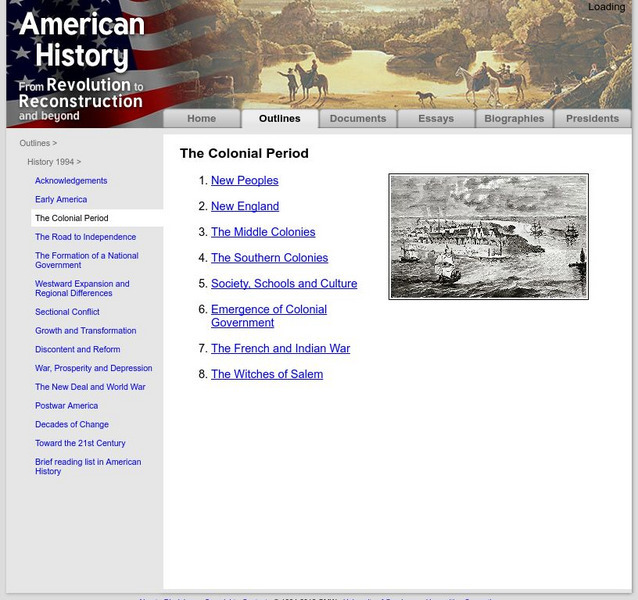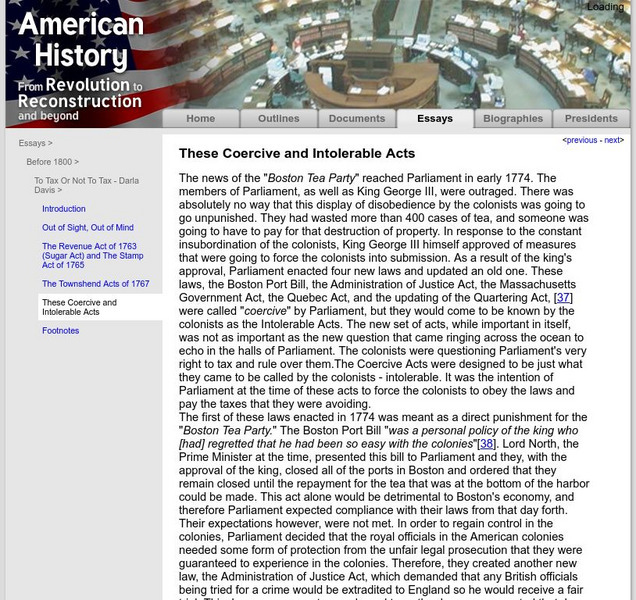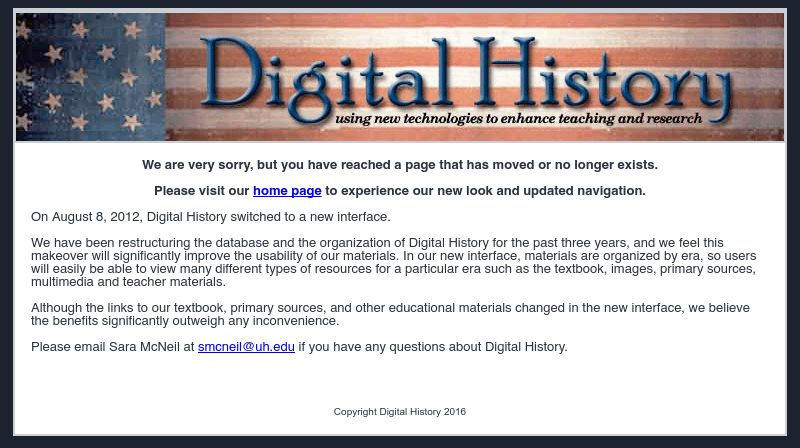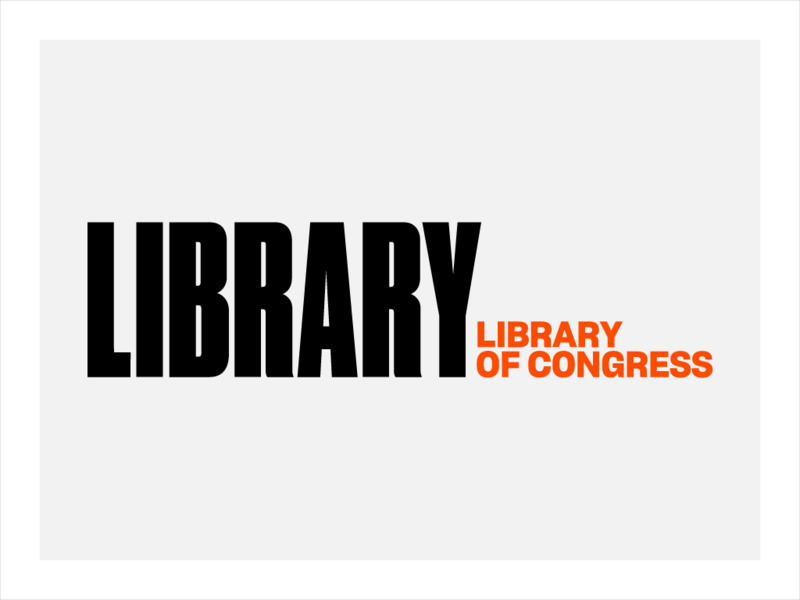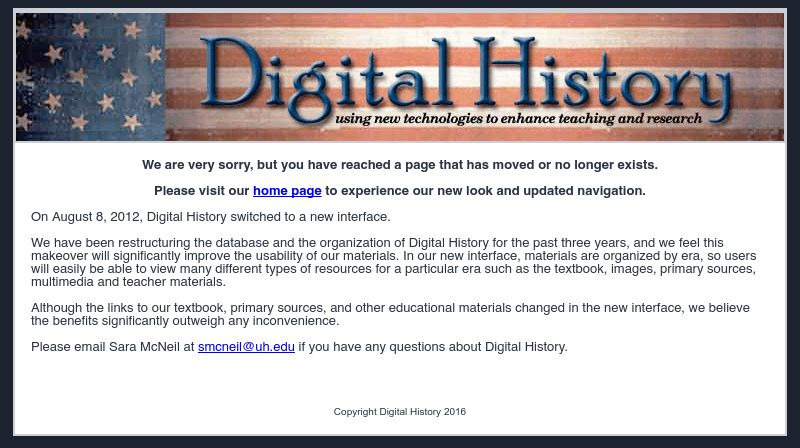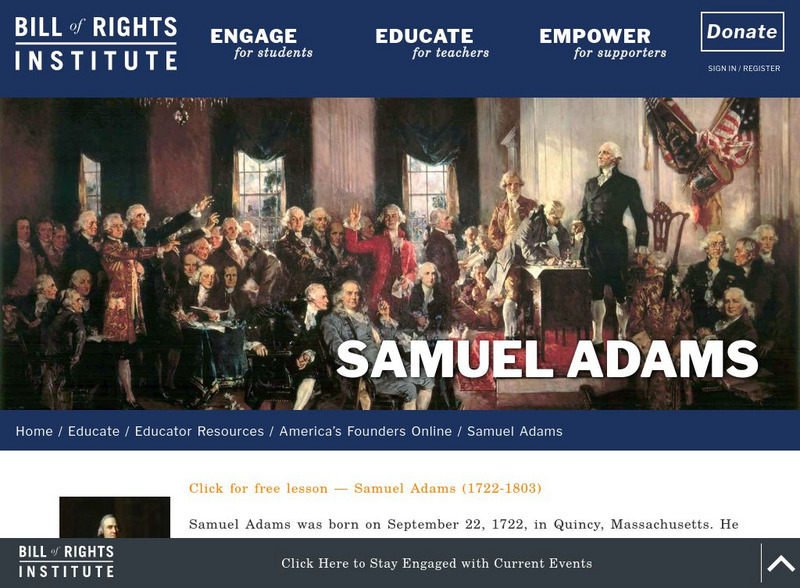Hi, what do you want to do?
University of Groningen
American History: Outlines: The Colonial Period
A brief discussion of the colonial period in the United States. Includes information on New England, the middle colonies, and the southern colonies. Also, find out about the early government, and the French and Indian War.
University of Groningen
American History: Outlines: Boston "Tea Party"
In 1773, however, Britain furnished Adams and his allies with an incendiary issue. The powerful East India Company, finding itself in critical financial straits, appealed to the British government, which granted it a monopoly on all tea...
Other
Our American Revolution: The American Revolutionary Cities
The major cities in colonial America played a huge role in preparing for the Revolutionary War, both in terms of ways of governing and philosophy. Read about Philadelphia, Williamsburg, New York, and Boston and the events in those cities...
Colonial Williamsburg Foundation
Colonial Williamsburg: Patrick Henry
Biographical note on Patrick Henry, the lawyer, patriot, orator, and symbol of the American struggle for liberty and self-government during the American Revolution.
University of Groningen
American History: Essays: The Intolerable Acts
This resource gives a comprehensive account of the Intolerable Acts, why they were passed, colonists' reactions, and particulars surrounding the Massachusetts Government Act and other Coercive Acts with text links and references.
Curated OER
National Park Service: Ellis Island: Colonial and Early American New York 1609 1890
Provides an overview of the history of New York and of how the United States government came to acquire Ellis Island. Fort Gibson was built there prior to the War of 1812 to serve as a strategic post in case of attack.
Annenberg Foundation
Annenberg Learner: America's History in the Making: The New Nation
After the War of Independence, Americans were unable to agree on the form of their federal government. This unit explores how those conflicts played out as the new Republic defined its identity in relation to other nations.
Khan Academy
Khan Academy: Guaman Poma and the First New Chronicle and Good Government
This letter written by Guaman Poma is the most famous manuscript from South America dated to this time period in part because it is so comprehensive and long, but also because of its many illustrations. View pictures of the illustrations...
Digital History
Digital History: By What Right [Pdf]
Two opposing philosophies concerning the relationship between government and its citizens were expressed by Thomas Hobbes and John Locke in the 17th century. Compare these two philosophies and see how they were related to the colonists'...
American Museum of Natural History
American Museum of Natural History: African Ethnography
The Anthropology Division's African collection is extensive in terms of geographic coverage. It includes North Africa, West Africa, and Madagascar, although its greatest concentration of material is from central and southern Africa. The...
Library of Congress
Loc: Journals of the Continental Congress
These journals from the Continental Congress of the United States will provide students with a greater understanding of the foundations of American government as established in the late 18th century. Includes handwritten documents by...
Independence Hall Association
U.s. History: Liberty Bell Timeline
Independence Hall Association provides a listing of important colonial dates. Also listed are the historical events which the Bell commemorates throughout American History.
Other
Fales Library and Special Collections: Jacob Leisler Papers Project
Resource chronicles the life and times of Jacob Leisler, "a political figure [who] played a major role in the North American world of European settlements in the seventeenth century," and leader of the Leisler's Rebellion.
A&E Television
History.com: What Did the Three Continental Congresses Do?
During the Revolutionary War, the Continental Congress became America's de facto government. Over a period of 15 years, from 1774 to 1789, the Continental Congress underwent a profound evolution. Starting out as a temporary group that...
BBC
Bbc: History: Edmund Burke (1729 1797)
A one-page summary of the life and philosophy of influential eighteenth-century Anglo-Irish Parliamentarian Edmund Burke, whose theories of government led him to sympathize with the American colonists against the British crown, to...
Digital History
Digital History: The Road to Revolution
A review of the Age of Revolution, particularly as it was perceived in the American colonies. See how the various actions taken by the British government to control the colonists resulted in uniting the colonists and set the stage for...
Library of Congress
Loc: The Constitution: Counter Revolution or National Salvation
Using primary texts and prior study of Colonial America and the Revolution, students examine "what type of government would best represent the ideals of the American Revolution." Worksheets, discussions, and role-playing within this...
Other
Liberty Online: A Summary View of the Rights of British America
Written before the Declaration of Independence, this lengthy essay by Thomas Jefferson argued that the British Government was treating America unfairly. This site contains full text and footnotes within text hyperlinked to panel at...
The History Cat
The History Cat: Countdown to Revolution
Begins with a description of the British system of mercantilism that was imposed on the American colonies along with the taxes levied through the Stamp Act and the Sugar Act. The Americans complained that it was taxation without...
Independence Hall Association
U.s. History: The Beginnings of Revolutionary Thinking
The American Revolution was close to 200 years in the making. Read about the philosophies and attitudes toward government, as well as the diverse populations who came to the British colonies, that eventually fomented rebellion.
Digital History
Digital History: Was the Revolution Justified?
A terrific look at the twenty-seven specific reasons Thomas Jefferson cited in the Declaration of Independence and the support for those reasons of why the colonists felt justified in breaking the bonds with Great Britain.
Bill of Rights Institute
Bill of Rights Institute: Samuel Adams
Samuel Adams was born on September 22, 1722, in Quincy, Massachusetts. He entered Harvard College at the age of 14. During the 1760s, Adams became a leader of the Patriot resistance to the British government's attempt to tax the American...
Read Works
Read Works: Some Laws Are Intolerable
[Free Registration/Login Required] An informational text about the British Acts that lead to the Boston Tea Party and to the writing of the Declaration of Independence. A question sheet is available to help students build skills in...
Curated OER
Map: Imperialism and the Balance of Power
World maps of the Colonial Empires of 1914 as well as their revenues during that time period. There are also maps depicting urban growth, type of government, wars and atrocities, and living conditions of the world in 1900.





